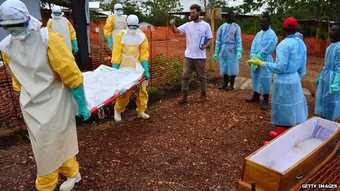British military engineers and medics are being sent to Sierra Leone to help fight the world’s largest-ever outbreak of Ebola.
They will set up and run a treatment centre near the capital Freetown.
The World Health Organization says more than 2,000 people have now died in the outbreak in West Africa.
Last week, the charity Medecins Sans Frontieres called for a global military intervention in the region.
It said the global response to the outbreak had been “lethally inadequate” with countries turning their back on West Africa and merely reducing the risk of Ebola arriving on their shores.
The UK has announced it will build a centre with 50 beds for people in Sierra Leone and 12 beds for healthcare workers who become ill.
The proposed site will be surveyed this week, with the healthcare worker section of the facility scheduled to be running within eight weeks.
Yesterday, President Obama said the US military would set up isolation units and provide security for public health workers.
International Development Secretary Justine Greening said: “The scale of the problem requires the entire international community to do more to assist the affected countries which is why the UK is working with the government of Sierra Leone to build a new medical treatment facility near their capital Freetown.
“When it is up and running it will enable the UK to provide medical care for local and international health workers, as well as treatment for the wider population.”
The UK government has committed £25m to tackling the outbreak, including running trials for an Ebola vaccine.
The charity Save the Children will eventually take over management of the treatment centre.
Its chief executive, Justin Forsyth, said: “Ebola threatens thousands of people’s lives across West Africa and could set back development many decades.
“The key to combating this epidemic is backing front line health workers and underpinning a fractured health system in Sierra Leone.
“Without urgent action to assist medics, many more children and their families will suffer and die from this most appalling and tragic disease.”


